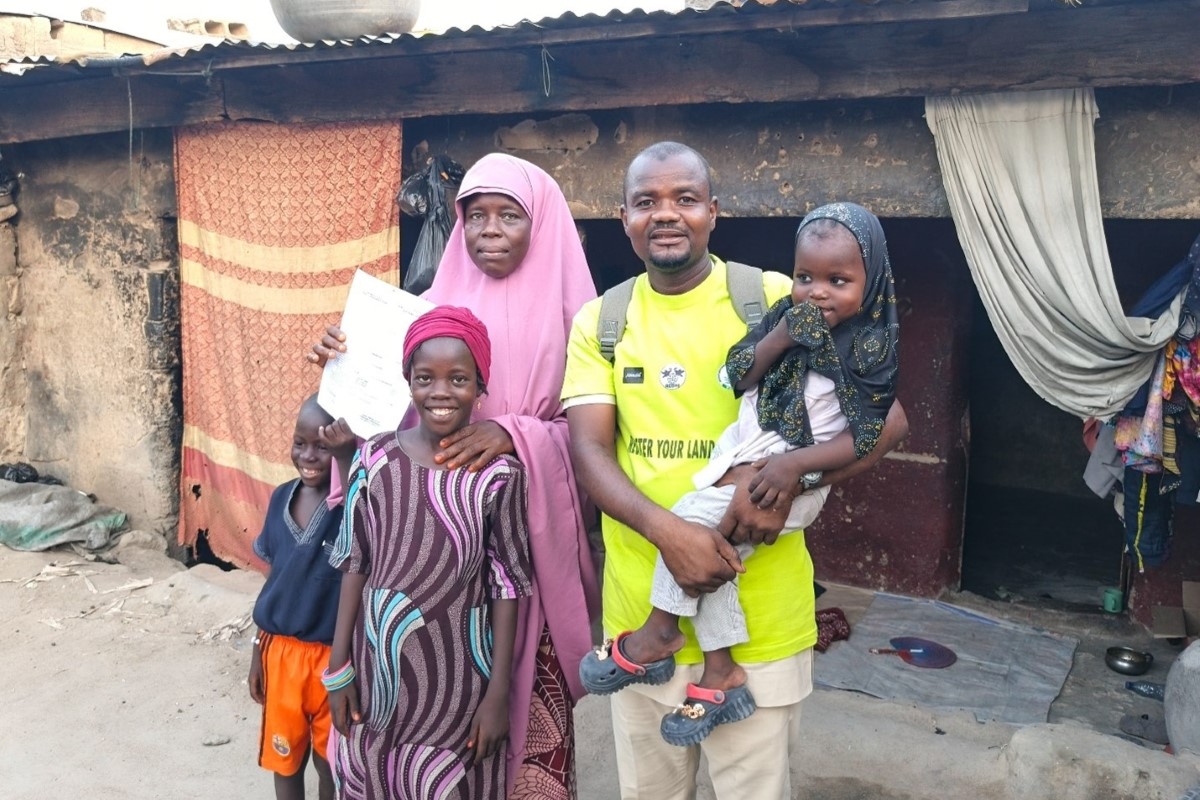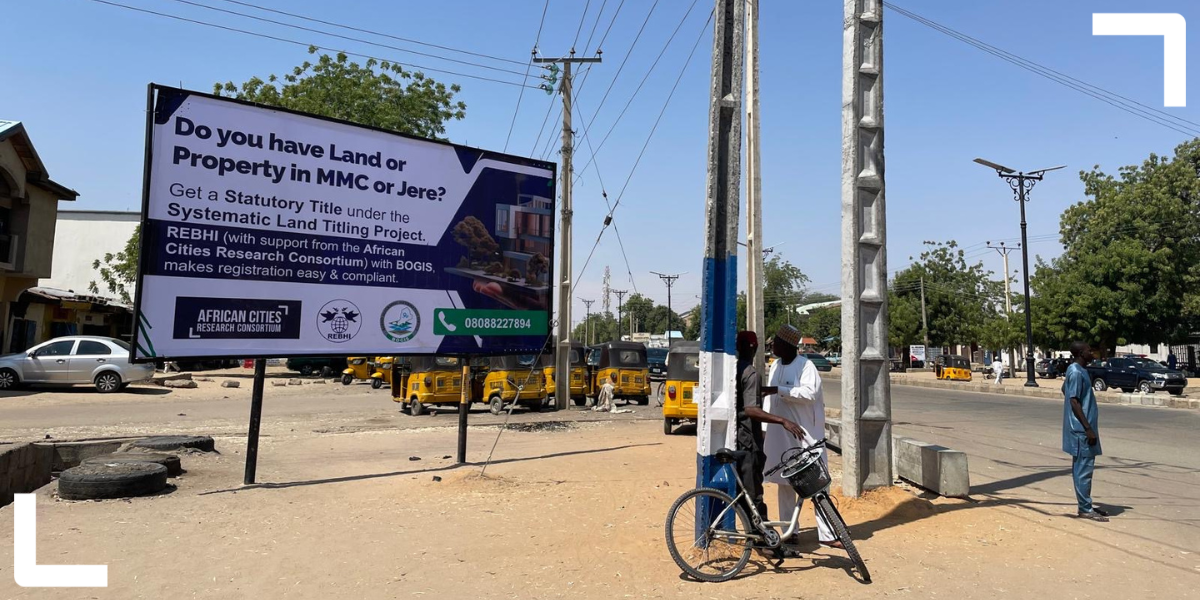By the ACRC Maiduguri project team
In Borno State, where conflict and displacement have reshaped lives for over a decade, one document is quietly empowering women like never before – a land title.
For years, countless women have built homes, supported families and maintained property, yet remained invisible in the eyes of the law. Lacking legal ownership, many were vulnerable to eviction, family disputes and the loss of everything they had worked for.
But that story is beginning to change.
Through the Systematic Land Titling Project, implemented by the Rehabilitation Empowerment and Better Health Initiative (REBHI) in collaboration with the Borno State Geographic Information Service (BOGIS) and with support from the African Cities Research Consortium (ACRC), women across informal settlements in Maiduguri are now registering their land – and receiving statutory rights in their own names.
This isn’t just paperwork. It’s protection. It’s power. It’s peace of mind.
Why land titles matter – especially for women
In northern Nigeria, traditional and religious customs often dictate how land is inherited and owned. These systems, while respected, can unintentionally leave women behind.
Many women contribute to buying or developing land but register it under male relatives’ names – due to social norms, fear of backlash, or lack of awareness.
Without legal documentation, women face multiple risks:
> Widows can be pushed out by extended family.
> Divorced women and single mothers may lose access to the only homes they know.
> They cannot legally transfer land to children, access credit or prove ownership.
Take Halima, a 52-year-old widow from Maiduguri. After her husband’s passing, she was nearly evicted by relatives.
“I had no idea I could claim the house. I didn’t even know land could be registered in a woman’s name. When I got my statutory right, I finally felt secure.”

The project: Bringing legal ownership to the grassroots
What makes the Systematic Land Titling Project groundbreaking is how it brings land registration directly to the community – especially low-income and informal settlements.
Led by REBHI, with technical implementation by BOGIS and support from ACRC, the project is intentionally designed to be inclusive, simple, and accessible.
Here’s how the process works:
1. Community mobilisation and sensitisation
REBHI works closely with traditional leaders, women’s groups and local associations to raise awareness. Outreach events help explain:
> What a statutory title is
> Why it matters
> Who is eligible
> How to begin the process
These culturally-sensitive forums empower women to ask questions and learn their rights.
2. Application support
Support staff, including some lower-level traditional or community leaders, are stationed in targeted neighbourhoods to assist residents with:
> Filling out registration forms
> Organising supporting documents (like community witness statements or sale agreements)
> Answering questions, especially for those with limited literacy
Special effort is made to prioritise vulnerable groups, including widows, elderly women, and people living with disabilities (PLWDs).
3. Technical verification and data capture
BOGIS then conducts land data capture and physical verification to confirm boundaries and ownership claims. This stage includes mapping and photographing the land.
Local leaders often accompany the team to mediate disputes or confirm ownership, and women’s voices are actively considered in shared-property situations.
4. Issuance of statutory rights
Upon approval, BOGIS issues a statutory land right – not a Certificate of Occupancy, but a legally recognised document – formally acknowledging the woman as the landholder.
In many cases, this is the first legal document a woman has ever owned in her name.
A game-changer for women – and entire communities
The project has already changed lives; 94 women have received statutory rights so far, each representing a personal victory over years of legal invisibility and vulnerability.
Fatima, a single mother and roadside vegetable seller, bought a plot ten years ago but never registered it.

“I thought land registration was only for rich or educated people. REBHI helped me through it. Now my name is on my own land. I feel like I belong.”
Zainab, a 60-year-old widow, endured years of threats from in-laws trying to take her home. After receiving her statutory right, the harassment stopped.
“When I received the title, I cried. Finally, the law was with me – not against me.”
And many others, including people with disabilities, are gaining secure footing in a society where documentation often determines access to justice and opportunity.
Why this matters for the bigger picture
The benefits go beyond individual women. Statutory land titling contributes to:
> Peacebuilding – by reducing land-related disputes within families and communities.
> Economic empowerment – women can invest confidently, build stronger homes and use property as collateral.
> Urban planning – government can better plan and develop informal areas.
> Social change – norms around gender, ownership and rights are evolving.
One key feature of the project is free land registration for female beneficiaries, a critical enabler for low-income women who would otherwise be excluded by cost.
By eliminating registration fees, the programme ensures that economic status does not determine a woman’s access to legal ownership.
What’s next?
With growing awareness and rising demand, REBHI and its partners are committed to expanding the project across Borno State. To sustain momentum, the following are vital:
> Policy reforms to simplify the land registration process.
> Deeper engagement with religious and traditional authorities.
> Expansion of outreach into rural and hard-to-reach communities.
> Inclusive budgeting to prioritise women and marginalised groups.
A future built on security and dignity
For many women in Borno, land ownership is not only about property, but about visibility, security and having a stake in their future as well. With each statutory right issued, a new story is being written – one of inclusion, empowerment and resilience.
And for the first time, the land under their feet is more than simply a place to live. It’s a symbol of who they are, what they own and what they can pass on.
This is what happens when land is placed in her name.
Photo credits: ACRC Maiduguri project team, Diana Mitlin
Note: This article presents the views of the authors featured and does not necessarily represent the views of the African Cities Research Consortium as a whole.
The African Cities blog is licensed under Creative Commons Attribution-NonCommercial-NoDerivatives 4.0 International (CC BY-NC-ND 4.0), which means you are welcome to repost this content as long as you provide full credit and a link to this original post.


